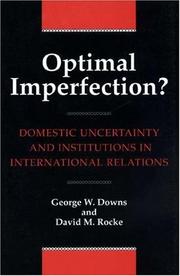| Listing 1 - 2 of 2 |
Sort by
|
Book
ISBN: 0691227896 Year: 1998 Publisher: Princeton, N.J. : Princeton University Press,
Abstract | Keywords | Export | Availability | Bookmark
 Loading...
Loading...Choose an application
- Reference Manager
- EndNote
- RefWorks (Direct export to RefWorks)
Why would sovereigns ever grant political or economic liberty to their subjects? Under what conditions would rational rulers who possess ultimate authority and who seek to maximize power and wealth ever give up any of that authority? This book draws on a wide array of empirical and theoretical approaches to answer these questions, investigating both why sovereign powers might liberalize and when. The contributors to this volume argue that liberalization or democratization will only occur when those in power calculate that the expected benefits to them will exceed the costs. More specifically, rulers take five main concerns into account in their cost-benefit analysis as they decide to reinforce or relax controls: personal welfare, personal power, internal order, external order, and control over policy--particularly economic policy. The book shows that repression is a tempting first option for rulers seeking to maximize their benefits, but that liberalization becomes more attractive as a means of minimizing losses when it becomes increasingly certain that the alternatives are chaos, deposition, or even death. Chapters cover topics as diverse as the politics of seventeenth-century England and of twentieth-century Chile; why so many countries have liberalized in recent decades; and why even democratic governments see a need to reduce state power. The book makes use of formal modeling, statistical analysis, and traditional historical analysis. The contributors are Paul Drake, Stephen Haggard, William Heller, Robert Kaufman, Phil Keefer, Brian Loveman, Mathew McCubbins, Douglass North, Ronald Rogowski, and Barry Weingast.
Libre entreprise. --- Liberalisme. --- Liberte. --- Absolutism. --- Accountability. --- Authoritarian regime(s). --- Belgium. --- Bolivia. --- Bureaucratic-authoritarianism. --- Civil society, organization of. --- Colombia. --- Credible commitment. --- Credible threat. --- Democracies. --- Divided government. --- Economic crisis. --- Ecuador. --- Electoral rules. --- Equilibrium. --- Feminism. --- Franchise. --- Gastil political freedom index. --- Glorious Revolution. --- Government structure. --- Honduras. --- Human rights. --- Ideology. --- Imperial factors. --- Individualism. --- Inflation. --- International factors. --- Knowledge. --- Legitimacy. --- Menem, Carlos. --- Mexico. --- Napoleon Bonaparte. --- Neoliberalism. --- New economics of organization. --- Order, internal. --- Philippines. --- Political learning. --- Population size. --- Regime change. --- Repression. --- Risks. --- Romania. --- Rule of law. --- Self-interest. --- Sovereign. --- Soviet Union. --- Taiwan. --- Transitions to democracy. --- Uruguay. --- Venezuela. --- Western Europe.

ISBN: 0691225206 0691044600 Year: 1996 Publisher: Princeton, N.J. : Princeton University Press,
Abstract | Keywords | Export | Availability | Bookmark
 Loading...
Loading...Choose an application
- Reference Manager
- EndNote
- RefWorks (Direct export to RefWorks)
"Domestic politics matters" has become a rallying cry for international relations scholars over the past decade, yet the question still remains: Just how does it matter? In this book, George Downs and David Rocke argue that an important part of the international impact of domestic politics springs from the institutional responses to its many uncertainties. This impact is due not so much to the errors in judgment these uncertainties can cause as to the strategic and institutional consequences of knowing that such errors are possible. The heart of the book is its formal analysis of how three kinds of domestic uncertainty have shaped international relations through their influence on three very different institutions. One chapter deals with the decision rules that citizens create to cope with uncertainty about the quality of their representation, and how these can lead to the paradoxical "gambling for resurrection" effect. Another chapter describes the extent to which the weak enforcement provisions of GATT can be understood as a mechanism to cope with uncertain but intermittent interest group demands for protection. The third chapter looks at the impact of uncertainty on the creation, survival, and membership of multilateral regulatory institutions, such as the Montreal Protocol and EU, when some states question the capacity of other states to meet their treaty obligations.
GATT. --- Theory. --- EU. --- Domestic politics. --- International politics. --- Abreu, Dilip. --- Adventurism. --- Asymmetric information. --- Balance of Power. --- Bargaining costs. --- Bayesian learning. --- Bilateral agreement. --- Brinkmanship. --- Capability. --- Capacity change. --- Certainty effect. --- Chief executive. --- Compensation. --- Compliance. --- Contraction. --- Coordination regime. --- Cournot equilibrium. --- Democracy. --- Deterrence. --- Diversionary war. --- Domino effect. --- Election sanction. --- Enforcement. --- Environmental regulation. --- Equilibrium refinements. --- Fearon, Jame. --- Fundamental attribution bias. --- Gambling for resurrection. --- Gibbons, Robert. --- Glorious Revolution. --- Haas, Peter. --- Hegemonic stability game. --- Humes, Brian. --- Imperfect information. --- Information uncertainty. --- Institutionalist tradition. --- Interest groups. --- Jervis, Robert. --- Kahneman, Daniel. --- Kreps, David. --- Lafay, Jean-Dominique. --- Loss aversion. --- Median voter. --- Multilateral agreement. --- Multilateral institution. --- Multipolarity. --- New economics of organization. --- Nontariff barriers. --- Osborne, Martin. --- Pareto-suboptimal solutions. --- Perfect information. --- Preventive wars. --- Protectionism.
| Listing 1 - 2 of 2 |
Sort by
|

 Search
Search Feedback
Feedback About
About Help
Help News
News